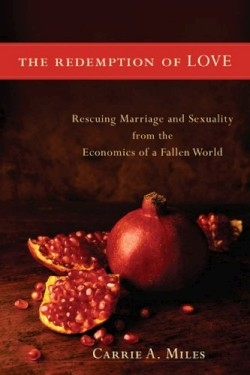The Redemption of Love
Rescuing Marriage and Sexuality from the Economics of a Fallen World
The questions about gender with which Christendom—and society at large—must reckon are vital. What does it mean to be a man? What does it mean to be a woman? Which social roles should be embraced because they are dictated by biology or faith, and which ones may be cast off because they are mere cultural conventions?
It is these essential questions that this book seeks to answer. The author, who is a psychologist and associate director of the Association for the Study of Religion, Economics, and Culture, as well as associate director of the Consortium for the Economic Study of Religion, brings knowledge of both economics and Christianity to bear on the topic of gender roles.
From the outset, Miles invites controversy—and honest analysis of the issue at hand—by dispensing with the popular notion that increasingly lax sexual mores are destroying the institution of the family. “The sexual revolution, rising rates of divorce, promiscuity and unmarried births are the results, not the cause, of the breakdown of the family,” she boldly asserts.
Miles then goes on to posit an economic explanation for these changes in society: “In preindustrial societies, families were the original ‘social safety net’ […] Often the larger the family the better, as even very young children provided important labor, and the services of older children were indispensable. Over the last two hundred years, however, technological advances eliminated the economic imperative for family.”
Having become expensive luxuries rather than income-producing assets, children have lost their value to society. As a result, Miles argues, the social structure designed to support them—namely, marriage—has lost its raison d’etre, and sexual expression outside of marriage is no longer taboo.
This causes problems, though—if they are to grow up healthy, children need cohesive families. But having lost its economic imperative in a postindustrial world, how can marriage provide that cohesion?
Miles’s social and economic analysis of the family throughout history is masterful, but it is here, in offering the solution to these problems, that her book is most important. Using her own analysis of the Song of Songs from the Old Testament of the Bible, Miles argues that Christians should view love as an opportunity to serve others, rather than exert power over them. This matches Jesus’ teachings and example, but contradicts centuries of teachings on marriage as a hierarchy.
While her interpretation of the Song of Songs is fanciful, and a few of her assertions could benefit from additional supporting evidence, Miles’s overarching argument is compelling. This significant book brings the reader closer to logical, satisfying answers to the vital questions about gender—and humanity.
Reviewed by
Melanie Seibert
Disclosure: This article is not an endorsement, but a review. The publisher of this book provided free copies of the book to have their book reviewed by a professional reviewer. No fee was paid by the publisher for this review. Foreword Reviews only recommends books that we love. Foreword Magazine, Inc. is disclosing this in accordance with the Federal Trade Commission’s 16 CFR, Part 255.

